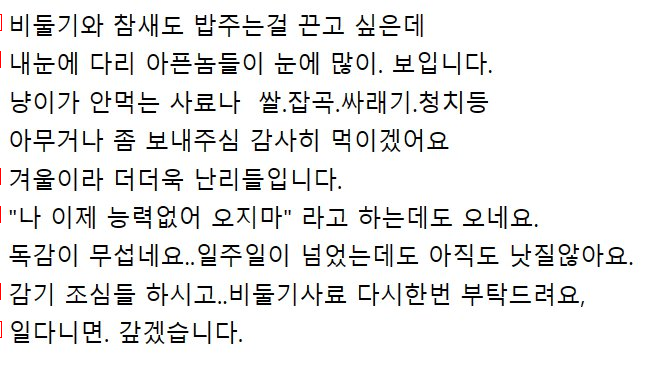
image text translation
(1)I want to turn off the pigeons and sparrows
(2)I see a lot of leg pain in my eyesI’d appreciate it if you could send me food that the cat doesn’t eat or rice-grain scallop
(3)It’s winter, so it’s all the more chaotic
(4)I’m not good at it anymore. They’re saying, “Don’t come”
(5)I’m afraid of the fluIt’s been more than a week, but I still don’t get better
(6)Be careful not to catch a cold. Please feed your pigeon again
(7)I’ll pay you back when I’m working

image text translation
(1)Feeding a pigeon is
(2)It’s the mistreatment of animals
(3)● Busan Jin-gu Environmental Greening Division
In 2009, the pigeon was designated as a noxious wild animal
Surprisingly, feeding was not prohibited
There are no punishment regulations such as fines or fines, so it is only to guide the ban on feeding with banners as above

image text translation
(1)The true story Pick, a woman who sows a bag of food on the road of the deep-seated Hansa University
(2)No pigeon feeding
(3)The act of giving away the general building’s performance
(4)A woman who gives pigeon rice even if there is a no-food banner
There’s no punishment regulation, so there are quite a few people who feed them like this

image text translation
(1)Cockroach in the sky, pigeon feeding the elderly
(2)It’s possible to stop it
(3)Input 20231220 PM 903 Article Statement
(4)Reporter Kim Jung-wook
(5)one family
(6)Amendment to the Wildlife Protection and Management Act The National Assembly’s decision also prohibits the breeding of bears for the collection of gossip
httpsnnewsnavercommnewsarticle0110004277071sid=102
As a result, the Wildlife Act has been revised to impose fines for feeding harmful wildlife
I have some doubts about the effectiveness of this as well
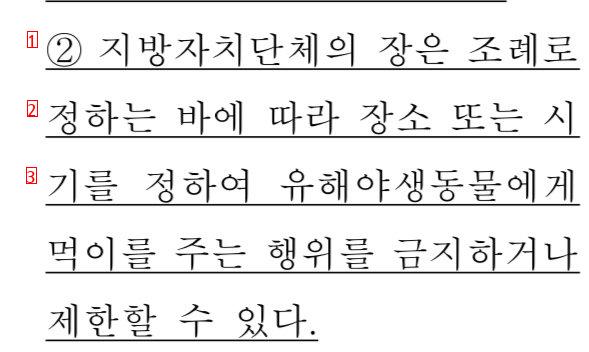
image text translation
(1)② by ordinance of the head of a local government
(2)a place or city as prescribed
(3)The act of feeding harmful wild animals may be prohibited or restricted by setting a flag
(1)③ in any of the following subparagraphs
image text translation
(2)1 million won for that person
(3)impose a fine under
(4)7 Omitted
(5)8 A person who fails to comply with safety rules under Article 23 (7); Article 23 (6)
(6)8-2 A person who fails to comply with the method of treating harmful wildlife under Article 23(8) 8-2 Article 23(7)
(7)9 Same as current 9 omitted
(8)9-2 A person who has committed prohibited or restricted acts under Article 23-3 (2)
This is the additional clause
Under Article 23-3 (2), the head of a local government may prohibit the feeding of harmful wild animals
It has been revised to impose a fine of up to 1 million won for violating this
In fact, even if there is no provision for delegating these ordinances, it is possible to impose fines by ordinance
In fact, the Seoul Metropolitan Government tried to impose a fine on pigeon feeding as an ordinance
It was canceled due to opposition from animal groups
I don’t know if local governments can decide to ban feeding in this situation
Of course, I’m not saying that this amendment is meaningless
It’s quite a legal matter to create a new fine as an ordinance, to do this without the delegation of higher statuteslook at
It’s much easier to simply decide not to feed them
However, considering the above reality, I think it would have been better to just make it a compulsory rule
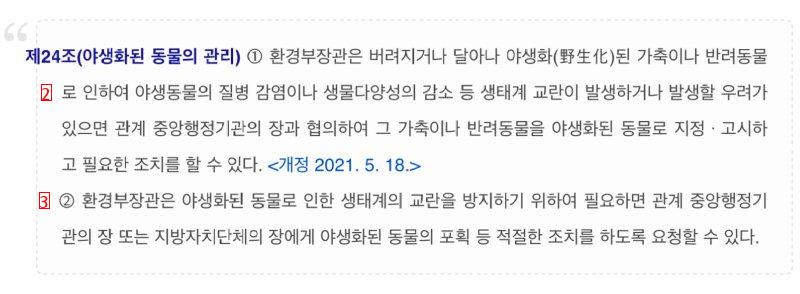
image text translation
(1)Article 66 The management of wild animals ① The Minister of Environment is a domestic animal or companion animal that has been abandoned or run away from wildflower 野
(2)Where there is a risk of ecosystem disturbance, such as infection of wild animals or reduction of biodiversity, the head of the relevant central administrative agency may designate and publicly announce the livestock or companion animal as a wild animal and take necessary measures in consultation with the head of the relevant central administrative agency
(3)② The Minister of Environment may, if necessary to prevent disturbance of the ecosystem caused by wild animals, request the heads of the relevant central administrative agency or the heads of local governments to take appropriate measures, such as capturing wild animals
The other question is why it only applies to harmful wildlife
In fact, there’s one more classification of harmful algae under the Wildlife Act It’s a wild animal
Under the Wildlife Act, animals whose livestock or pets are wild are not considered wild animals
In other words, wild dogs and stray cats are not wild animals, so they cannot be designated as harmful wild animals
It is designated as a wild animal
Right now, we’re the only designated wild cat
Even before the Wildlife Act was established in 2005, cats were designated as a noxious bird
And this is a wild animal that’s been separated into a wild animal
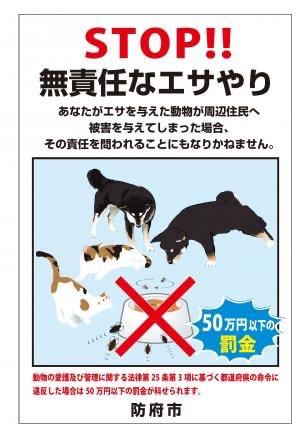
image text translation
In a good way, they may think that it is more regulated by the Animal Protection Act than by the Wildlife Act
In fact, in Japan, the Animal Protection Act, which corresponds to our Animal Protection Act, regulates the act of paying animals
Animal benefit activities that cause damage to the living environment, such as noise, dust, and dirt, are
According to Article 25 of the Animal Protection Act and its punishment clause, a maximum fine of 500,000 yen will be imposed
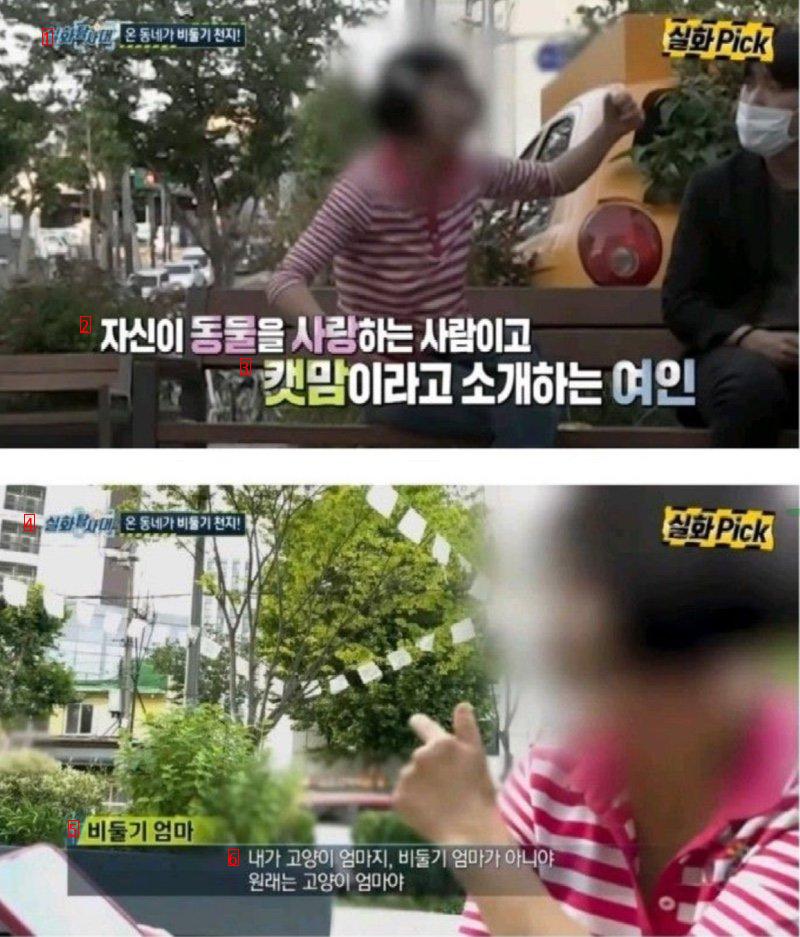
image text translation
(1)The whole neighborhood is full of pigeons!
(2)You’re a person who loves animals
(3)a woman who introduces herself as a cat mom
(4)The whole neighborhood is full of pigeons!True story pick
(5)mother of a pigeon
(6)I’m the cat’s mother. I’m not the pigeon’s mother. I’m the cat’s mother
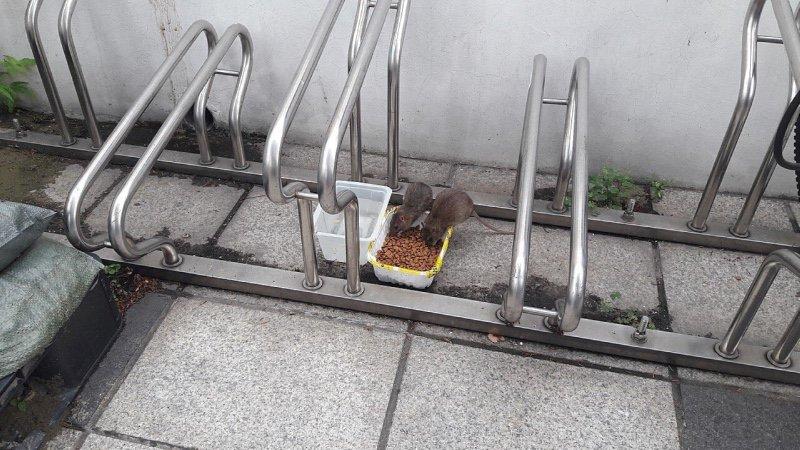
image text translation
In fact, it’s also a question of whether the ban should only target harmful birds
Japan’s Animal Protection Act does not have a pay ban
In principle, feeding of all wild and wild animals is prohibited
I think it would be better to specify exceptional cases such as rescue of protected animals
Pigeons feed other animals, too
Cat moms who feed cats gave rats and raccoons food
It’s all the more so because it’s a reality to breed rats and encourage wildlife to gather in residential areas